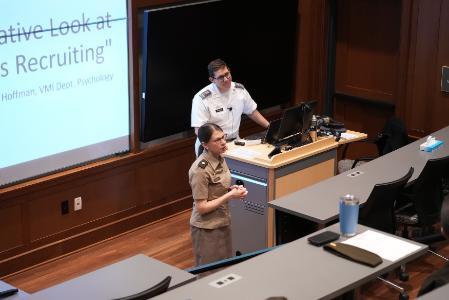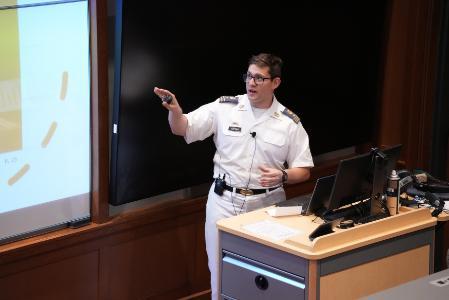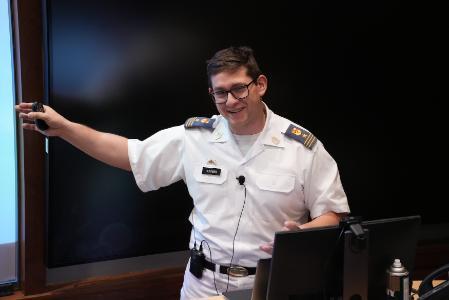Honors Week: A Look into VMI Recruiting Efforts

LEXINGTON, Va. March 28, 2024 — Adam Hoffman '24 was sparked by the strategic enrollment initiatives of Virginia Military Institute, and his instinct to help led him to his honors research topic.
As an honors student, he’s required to research a topic, so when he started thinking about enrollment numbers and recruitment efforts at VMI, he knew he found something he was interested in.
“I found out answers to three questions — how cadets found out about VMI, why they decided to come and how they're doing once they got here,” he said.
He was surprised by his findings, especially regarding how prospective cadets found out about the Institute.
“The most common way people are finding out about VMI is through their parents, which is surprising. Alumni and current cadets played a smaller role than I thought they would,” he said.
As part of VMI’s Honors Week, Hoffman presented his thesis “Virginia Military Institute Recruiting: How Cadets found their Way Here.”
He started his research last spring. He averaged about three hours a week on research, which spanned from learning how VMI recruits, sending out surveys to cadets, and talking with administration. From his research he said he’s gained a better understanding of statistics and clarity on the issue at hand. His goal now is to focus on a messaging plan moving forward to present to administration.
“For big things to change, we need to fix things between the Corps, the administration, and the alumni. I think it’s a great opportunity right now, since we’re getting a new commandant next year, having a working group of cadets involved,” he said. “It would be a good thing to change the perception of what’s going on here.”
He saw that VMI had a hard recruiting season for the Class of 2026. His research was aimed to look at the effectiveness of past resources in recruiting, specifically by studying cadets of the past four years. His thesis also touched on how cadets who were recruited prior to COVID-19 compared to post-COVID Rat Mass of 2027.

Col. Sara Whipple, assistant professor of psychology, was Hoffman’s advisor for the research. The two met weekly to make sure everything was on track. When they first met, it was mostly about fleshing out the specific research questions for Hoffman’s project.
“Though Adam already had his own ideas, we worked together to meld his college recruitment interests with psychological concepts,” Whipple said.
The largest step was crafting his Institutional Review Board application, which Whipple said is required any time there’s human participants in research.
Whipple said she was both hands-on and hands-off with Hoffman’s project. She also recognized his passion for understanding effective recruiting methods. She said this experience has allowed Hoffman to connect his interest in VMI recruitment efforts with the skills he's learned as a psychology major, specifically: ethics training, reading and critiquing empirical papers, designing study methodology, analyzing data, and ultimately writing and presenting a research paper.
“Adam's research has implications for VMI recruiting, which was his main motivation for completing this particular project,” Whipple said. “Adam's research examines the most common ways cadets first learned about VMI, their main motivation for attending, and their levels of well-being once at the Institute. Among other things, he finds a connection between family as a motivator and well-being. That said, although his sample is a reasonable size (300 cadets), further research using a fully representative sample is needed before we can be confident in the replicability of these findings.”
Whipple said that Hoffman was highly motivated for this topic. Despite some roadblocks concerning writer’s block and statistics, Hoffman persisted.
“Adam expresses confidence when he talks about his research methodology and results. He knows he can go from conceiving of an idea/question to getting the answer,” she said.
Laura Peters Shapiro
Photos by Kelly Nye
Communications & Marketing
VIRGINIA MILITARY INSTITUTE
.svg)
.png)

